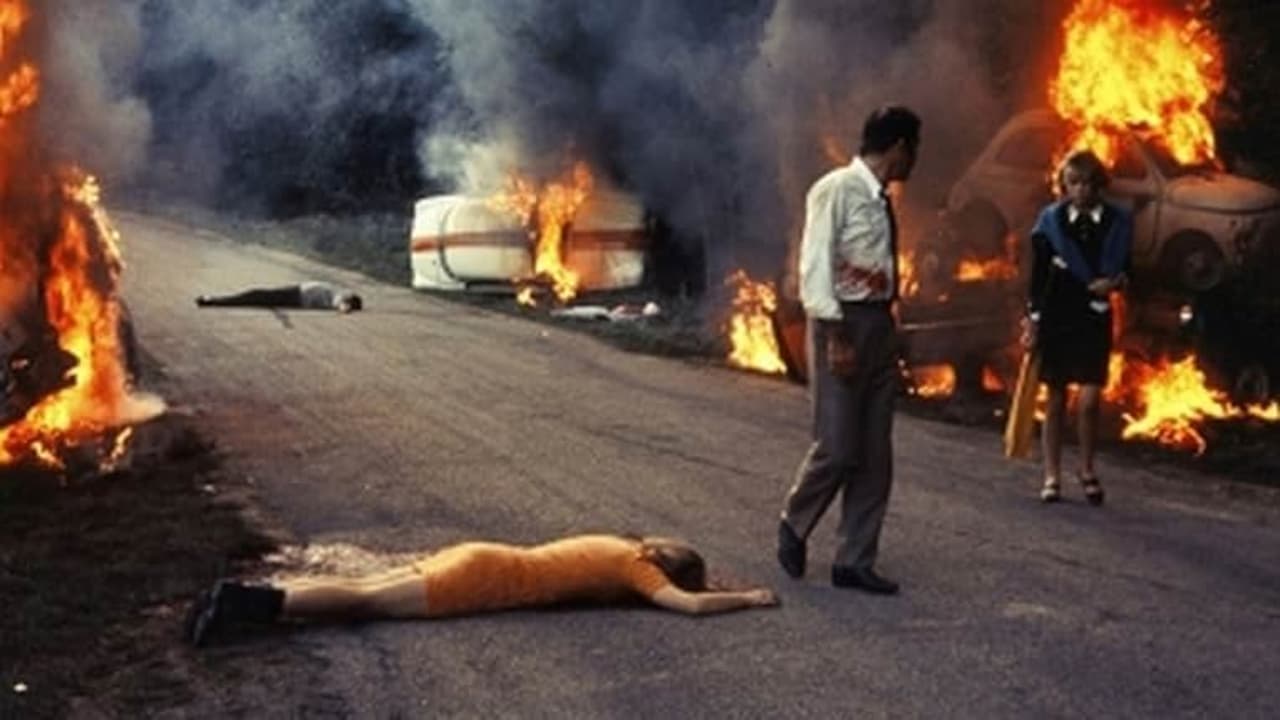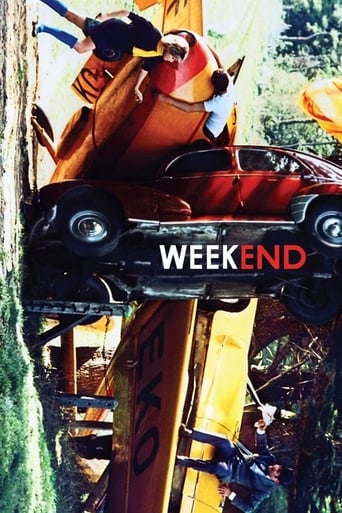

Meh. Pretentious as hell. Only interesting bit for me was the drummer's recitation, which was taken from Maldoror. Pathetic attempts to shock with bits taken from Bataille's Story of the Eye. As for the "longest traveling shot in the history of the cinema" and its "bravura technical mastery", as the shot moves along the various cars, you can see the reflection of the film crew moving along on the dolly, in the windows of various cars. I'm sure someone will say Godard did this on purpose. Yeah, sure.
... View MoreA supposedly idyllic week-end trip to the countryside turns into a never-ending nightmare of traffic jams, revolution, cannibalism and murder as French bourgeois society starts to collapse under the weight of its own consumer preoccupations.Following World War II, the French grew increasingly supportive of communism. Maybe not as a whole, but the intellectuals (such as Sartre) embraced it, and it seems a natural reaction following the Nazi occupation of the 1940s. Rejecting the extreme right does tend to push ideology to the left.Here we have a surreal satire on the class struggle in France in the 1960s. One of the most radical countries during one of the most radical decades. Many have compared this to Luis Bunuel's "Discreet Charm" and with good reason. They can both be seen as the artistic expression of the disdain for the upper class. I dare say this is the better film, even if probably the lesser-known.
... View MoreAlthough 'Weekend' contains unquestionable good Godard-symbolism, it requires knowledge about the Western world of 1967 to appreciate its plot to the full.As I suppose that merits like these are sufficiently dealt with in other reviews, I here concentrate on the male and female leads: Jean Yanne and Mireille Darc.Whatever the sound impact of 'Weekend', the suitability of Yanne and Darc for a film like this raise doubts. Yanne clearly fails in acting out the guy with his egoistic the-devil-may-care mentality: he's too soft for that. Mireille Darc's acting is only adequate: one feels that a different type of actress could have done better here.In this respect, I cannot escape a comparison with Godards 'Le Mepris' from 1963. Starring Brigitte Bardot. About this film is told that Godard did not want the world-famous Bardot, but could not ignore her urgent wish to act in a 'cultural' film. As expected, Bardot did not turn out well in 'Le Mepris'. So Godard came under pressure from his financiers to make the most of Bardot: he added an extended scene, showing her naked on a bed talking sex-loaded tales.In 1967 Yanne and Darc were national celebrities in France. Mireille Darc states in her 2005-autobiography 'Tant que battra mon coeur' (= French for 'this is the way my heart beats') that Godard asked her to go naked in 'Weekend'. She prepared for the part, but in the end Godard decided otherwise. Darc is filmed in her bra & panties, in an extended scene. Sitting on a table telling sex-loaded tales.
... View MoreWatching a film by Jean-Luc Godard is quite an experience: He is an "auteur", whose awareness of his medium is present in almost every shot; he makes extensive use of verfremdung by using title cards, sound design, breaking of fourth wall. Godard is with you in every shot. Surely, the Truffaut criterion applies here, stating basically: If you come a cross a film by an "auteur" on TV, not knowing it's by the "auteur", you will be able to guess him after the first few shots. Godard definitely is such a rare kind of artist. For me, the frustrating thing with many Godard films is a question: Is his highly sophisticated style justified by the things he wants to express? Usually, this leads my struggle with Godard films, the lack of themes behind his style: The usual Godard film is basically a rip-off of other movies, kind of elevated by a uniquely creative style. Sometimes he is ripping off screwball comedy ("Une Femme est une Femme"), sometimes gangster films ("A Bout de Soufflé"). Though for me, the fact that these rip-offs are visually as exciting as anything you will see (referring to "A Bout de Soufflé", off course), makes them hardly more than ripoffs. This basic quarrel with Godard's work led to my high expectations for his "Weekend" from 1967. Here is a theme: The movie deals with nothing less than our society's self-destruction through our inherent selfishness. The central image for this selfishness is the weekend trip. Already the departure for this very trip leads to an offbeat Godard moment when a bumped car virtually leads to a shootout. The theme of traveling coupled with aggression leads to the movie's most famous shots: The camera tracks across meters and meters of jammed cars, some of them turned over, with some passengers injured; other travelers play with a ball, throwing it from one car to another. It is an impressive shot as the camera keeps tracking, they keep playing and we keep watching. Generally, long takes are Godard's basic stylistic ingredient in "Weekend". There is an early scene in one take, a couple in a room, she is telling him about a disturbing sexual encounter. While the camera does not cut away from her explaining, the soundtrack keeps fading, so the inherent horror of the situation is entirely completed by the viewer. Those are nice scenes. But, alas, I guess they don't add up to much. When we are done with the scenes described above, there is a turn. The movie finally breaks into unforgivable speechifying that will make Marxists look at their watches. Don't get me wrong. Marxist themes can make good, even great, movies (see Eisenstein). My problem here is that Godard's style just doesn't equal the grandness of the social themes. There is another problem: Godard's films for me depend on characters. They might be approaching caricature in "A Bout de Soufflé", but hell you like these caricatures. "Weekend" does not have one memorable caricature, no likable presences. This includes the speechifying, because, well, who has ever seen a likable politician.
... View More